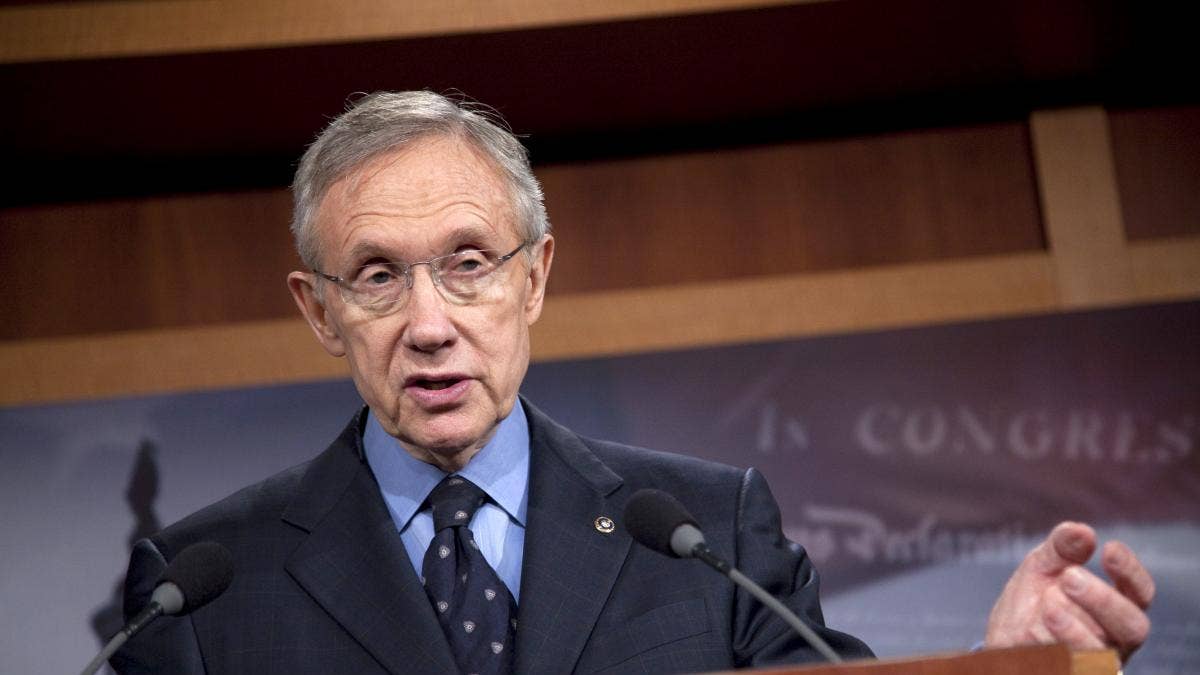
Senate Majority Leader Harry Reid, just back from a week-long trip to China, told reporters Wednesday he is ready to embrace a "deficit cap" ahead of a much-anticipated Congressional vote to raise the nation's debt ceiling.
Offering little detail on exactly how such a cap would work, the Nevada Democrat, who he had what he called an "extremely interesting" meeting at the White House on Tuesday, said it was akin to the debt fail-safe trigger in the presidents recently-announced in his deficit reduction plan.
Under that plan, not in place until 2014, if deficits are not stabilized and declining as a percentage of the gross national product, " the fail-safe will trigger an across the board spending reduction, including on spending through the tax code. The trigger will ensure that deficits as a share of the economy average no more than 2.8% of GDP in the second half of the decade," this according to a White House fact sheet.
"If we're able to cap deficits, it automatically brings down the debt," Reid said, echoing comments made by the Treasury Secretary Tim Geithner after the president released his plan in mid-April, who said Congress needed "a credible enforcement mechanism" so that deficit cutting targets are "meaningful."
At the time, Senate GOP Leader Mitch McConnell, R-Ky., released a statement saying, "Partisan speeches and promises of some future cuts after the President leaves office simply won't suffice.
Still, in a speech in New York on Tuesday, Geithner said that locking in such a trigger would buy Congress time to implement entitlement reform and other broad, complicated measures. "If we are able to legislate a broad framework with these key elements that locks in reforms over a multiyear period, constrains the ability of future Congresses and executive-branch officials to live with larger deficits," Geithner said, adding, "Then we do not need to resolve immediately all the basic choices that divide so much of the country."
Reid offered no further detail on what the Senate might actually end of considering, saying only, "There are all kinds of triggering mechanisms." Reid did reveal, though, that the Senate's bipartisan "Gang of 6," which, according to sources is unlikely to unveil its own deficit-reduction plan next week as they had hoped, is looking at a triggering mechanism, as well.
The White House said it's trigger would not include "Social Security, low-income programs, or benefits for Medicare enrollees," saying that would be "consistent with prior fiscal enforcement mechanisms put in place by Presidents Reagan, George H.W. Bush and Clinton."
Geithner and other Administration officials are working hard to come up with just the right kind of plan to tackle the rising tide of red ink, in order to get bipartisan support for a hike in the debt limit by June.
Reid called the upcoming debt ceiling vote "more important" than the recent near-crisis over funding the government. "If we're not able to do this, it will affect us for generations," the leader warned.
But as the White House and a number of lawmakers work to find a bipartisan compromise, Reid announced a more confrontational approach, taking aim at the budget recently released by House Budget Committee Chairman Paul Ryan, R-Wisc, a plan that would, among many things, convert Medicare into a kind of voucher program with subsidies for beneficiaries to purchase private health insurance. Democrats have, in particular, taken aim at this, accusing Republicans of trashing the seniors' federal health care program, and have not made any bones about taking it to the ballot box in 2012, either.
"Republicans seem to be in love with the Ryan budget. So we're going to have an opportunity in the Senate to vote on the Ryan budget and see if the Republican senators like the Ryan budget as much as their House colleagues did," Reid said. "Here's a piece of legislation that basically changes Medicare as we know it...We'll see how much the Republicans like it here in the Senate."
Don Stewart, spokesman for Mitch McConnell, responded, "Great. Did he say when we'll be voting on, you know, HIS budget? Or the President's budget? Or any budget written by a Democrat? They didn't pass one last year with 60 Democrat Senators, so I guess it's not a surprise that he's relying on a House Republican to do the work for them."




